March Policy Updates: Advocacy Updates, Event Reminders, and Engaging Opportunities Ahead!
In this Edition:
🌟 Join us for Hill Day visits on Thursday, May 2, during our Annual Conference.
📊 Discover FY 2024 spending details and President Biden’s proposals for FY 2025. We’re actively advocating for critical funding to support IHS programs.
⚖ Learn about our efforts supporting opioid use treatment programs and UIO representation in health IT modernization planning.
🗓 Stay informed about key legal cases impacting federal responsibilities and administrative law.
🌍 Mark your calendars for upcoming virtual meetings, consultations, and federal comment opportunities.
🚀 Explore our recent engagements, from policy webinars to advocacy efforts on Capitol Hill and beyond.
NCUIH Annual Conference Hill Day
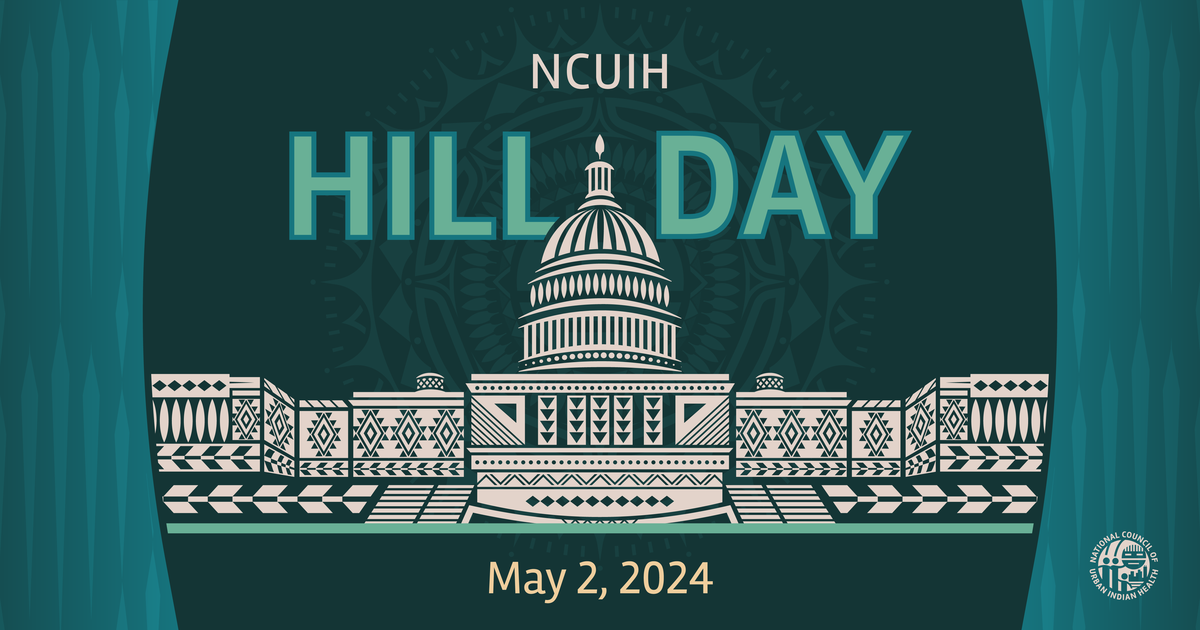
We invite you to join us for Hill Day visits on Thursday, May 2, during the annual conference. This opportunity allows you to engage with your representatives’ offices, advocating for urban Indian health issues and priorities.
Express your interest in participating by completing this form by Thursday, April 11.
NCUIH MEMBERS: As a member benefit, NCUIH will facilitate meetings with your Members of Congress, offer comprehensive background materials and training, and provide NCUIH staff to accompany you during your engagements. (Please note that the availability of NCUIH staff for meetings will be contingent upon scheduling constraints).
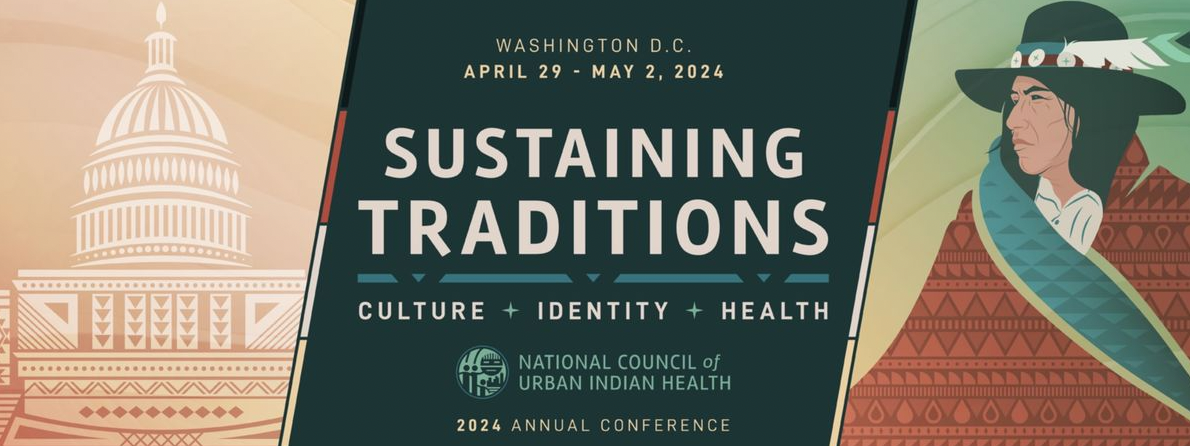
Registration for our 2024 Annual Conference closes on April 22.
Budget Update: FY 2024 Spending Bill Signed Into Law, President Biden Proposes a 15% Increase for Indian Health Service in FY 2025 Budget

On March 8, 2024, President Biden signed the Consolidated Appropriations Act, 2024 into law, setting the spending for six of the twelve appropriations accounts in Fiscal Year (FY) 2024, including the Interior bill.
By the numbers:
- $90.4 million appropriated for Urban Indian Health (flat funding)
- $6.96 billion appropriated for the Indian Health Service (IHS) (+$3.6 million).
- $5.19 billion appropriated for advance appropriations for IHS in FY 2025.
- The Special Diabetes Program for Indians (SDPI) was authorized for $130 million from March 9 through December 31, 2024. This brings the total funding to $158 million for Calendar Year (CY) 2024. See chart below on funding breakdown:
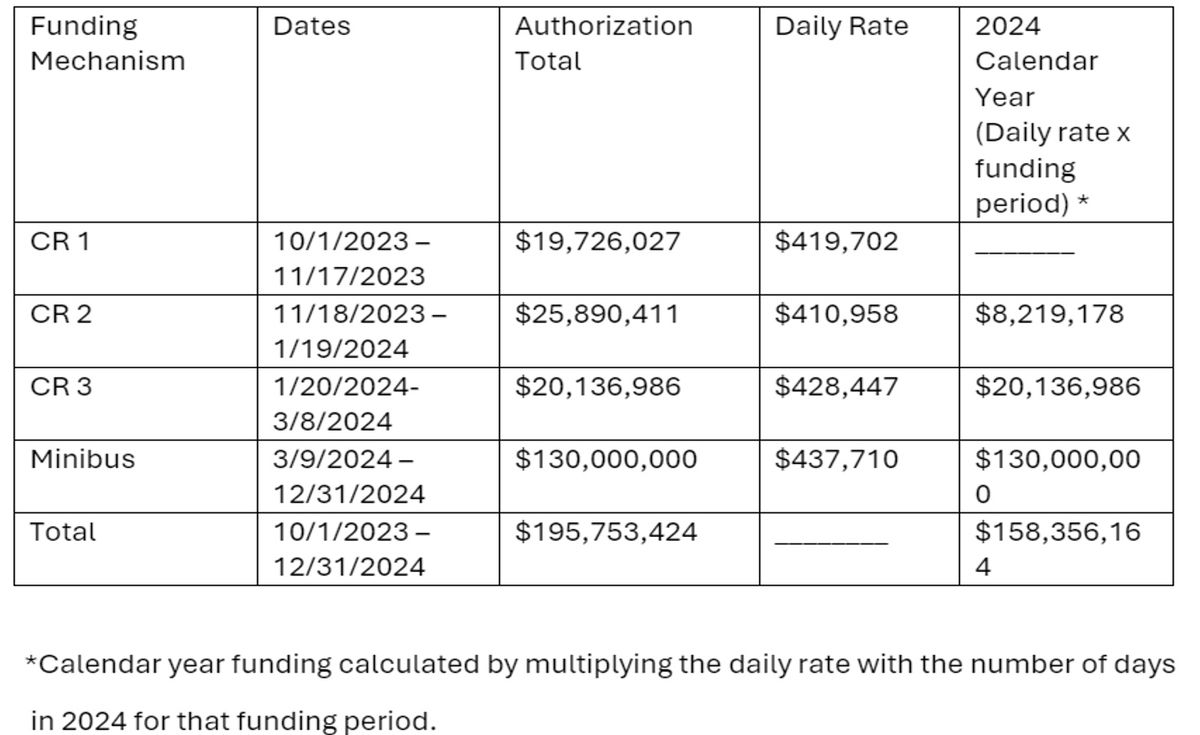
-
Go deeper: Read more on NCUIH’s blog.
On March 11, 2024, President Biden released his FY 2025 budget request, proposing a 15% increase for IHS & a 5% increase for Urban Indian Health.
By the numbers:
- $8.2 billion proposed for IHS for FY 2025
- $95 million proposed for urban Indian health for FY 2025
- $979 billion in indefinite discretionary appropriations proposed for Contract Support Costs
- $349 million in indefinite discretionary appropriations proposed for Section 105(l) Leases
- $260 million in mandatory funding proposed for SDPI
- Go deeper: Read more on NCUIH’s blog.
What’s next: NCUIH is actively submitting appropriations requests to Representatives and Senators from UIO districts/states.
NCUIH Advocates for Critical Funding for IHS to Support Opioid Use Treatment Programs & UIO Representation in Health IT Modernization Planning
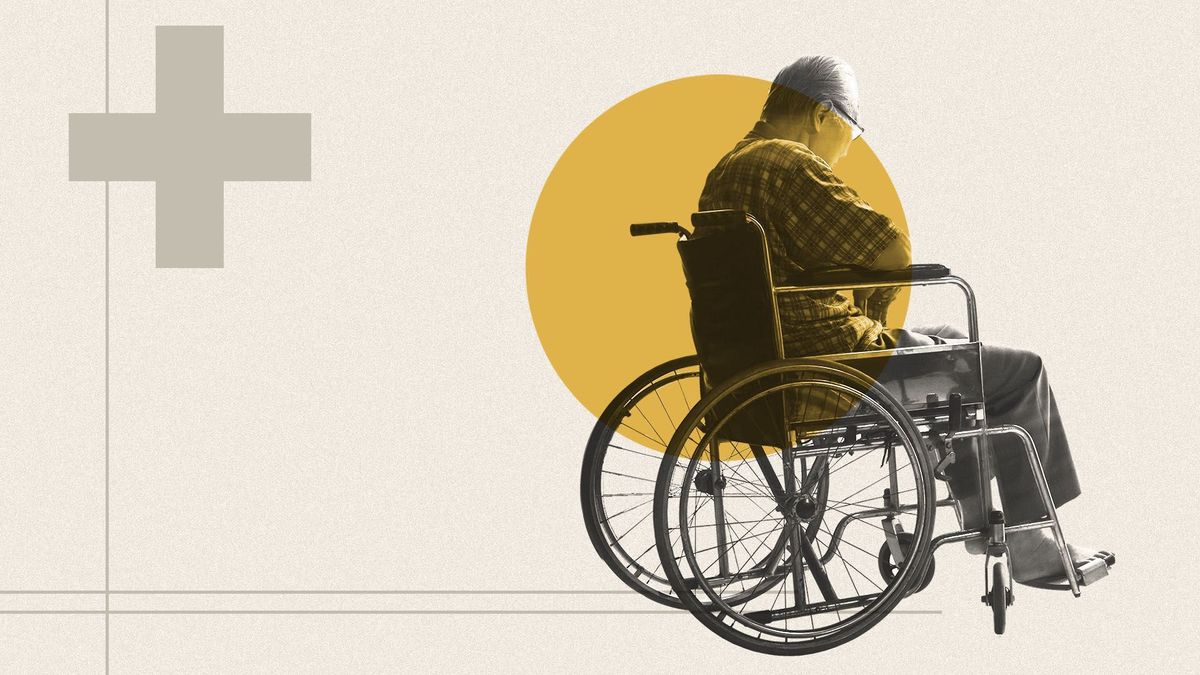
On March 22, NCUIH submitted comments to the Centers for Medicare and Medicaid Services (CMS) Center for Clinical Standards and Quality (CCSQ) regarding the American Indian and Alaska Native CMS Quality Improvement Program 13th Scope of Work, and the proposed expansion of CMS Quality Improvement Program to include all Tribal and UIO facilities.
-
The bottom line: NCUIH recommended that CMS host Urban Confers or UIO Listening Sessions to engage directly with UIOs, and ensure CMS Contractor has expertise in working with UIOs.
On March 8, NCUIH submitted comments to IHS regarding the Health IT Modernization Enterprise Collaboration Group (ECG).
-
The bottom line: NCUIH recommended that IHS ensure all UIO facility types are represented in the ECG Domain Groups, encourage consideration of interoperability by the ECG either through existing Domain Groups or a new Domain Group focused exclusively on interoperability, ensure Tribal and UIO representation on the ECG Executive Committee, and clarify expectations for subject matter experts that participate in the ECG Domain Groups.
On March 4, NCUIH submitted comments to IHS regarding $250 million Fentanyl and Opioid Programs.
-
The bottom line: NCUIH requested that IHS ensure noncompetitive funding awards across the I/T/U system, account for administrative duties and reporting requirements in the funding methodology, continue to engage with UIOs, consider partnering with the Substance Abuse and Mental Health Services Administration (SAMHSA) to create a whole family treatment approach, request full funding for the I/T/U system, including mental health, alcohol and substance abuse, and urban health line items.
Upcoming Federal Comment Opportunities:
April 24– CMS Traditional Healing Framework
- CMS is hosting an All Tribes Consultation on the Traditional Healing Framework on April 3, 2024, from 3:00-4:00 PM EDT. Register here.
- CMS is also seeking feedback on a proposed Traditional Healing Framework for section 1115 demonstrations following the All Tribes consultation.
- Comments are due to by April 24, 2024, and can be emailed to tribalaffairs@cms.hhs.gov.
March 28– National Institute of Health (NIH) Request for Information for FY 2026-2030 Strategic Plan for HIV and HIV Related Research
- NIH is seeking feedback from researchers, health care professionals, advocates and health advocacy organizations, scientific or professional organizations, federal/state/local government agencies, community, and other interested constituents on the development of the FY 2026–2030 NIH Strategic Plan for HIV and HIV-Related Research.
- Responses are due by March 28, 2024, and must be submitted electronically via this website.
- More information can be found here.
April 12 – Department of Health and Human Services (HHS) 26th Annual Tribal Budget Consultation
- On April 9-10, HHS is hosting their Annual Tribal Budget Consultation on the Agency’s FY 2026 budget request in Washington, D.C. Register here.
- HHS is seeking feedback on the HHS FY2026 Tribal budget request, and Written comments will be accepted through April 12 at 5:00pm EST and must be emailed to consultation@hhs.gov with the subject line “HHS Annual Tribal Budget Consultation.”
- More information can be found here.
October 1– HHS/United States Department of Agriculture (USDA) 2025 Dietary Guidelines Advisory Committee
- The 2025 Dietary Guidelines Advisory Committee is tasked with reviewing the current body of nutrition science on specific topics and questions and developing a scientific report that includes its independent, science-based advice for HHS and USDA to consider. The Committee’s review, along with public comments on its scientific report and agency input, will help inform HHS and USDA as they develop the Dietary Guidelines for Americans, 2025-2030.
- Comments are due to by October 01, 2024, and can be submitted electronically at www.regulations.gov.
Monitoring the Bench: Supreme Court Updates from NCUIH
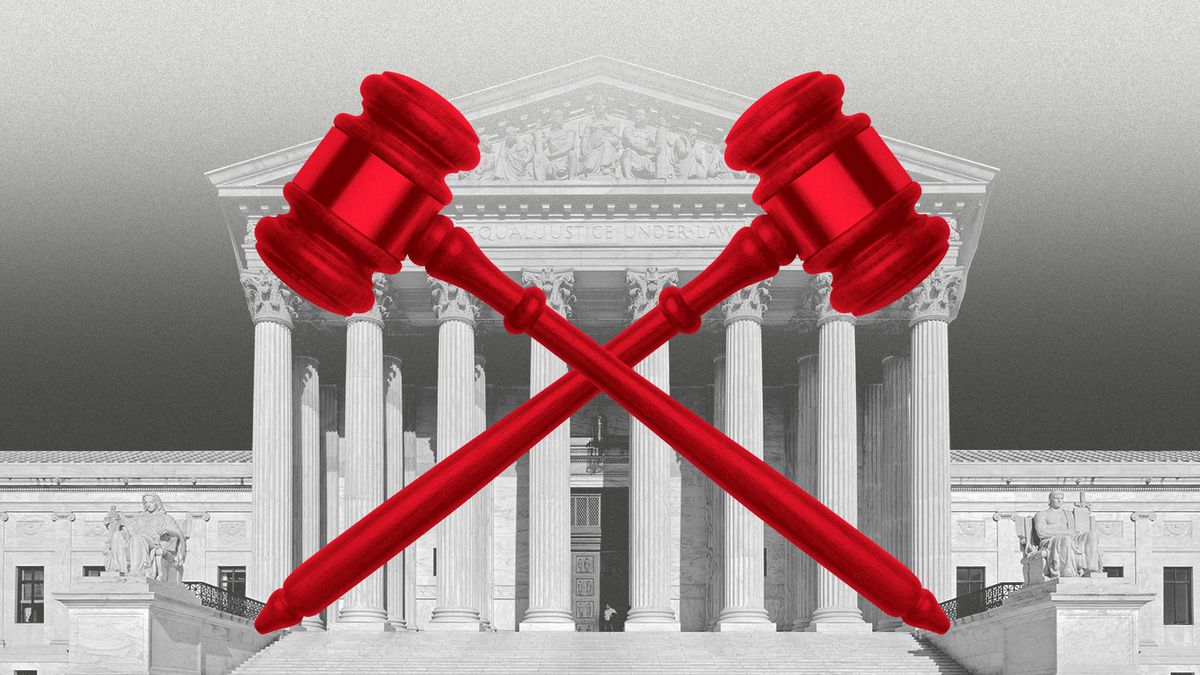
Becerra v. San Carlos Apache/Becerra v. Northern Arapaho Tribe (Consolidated)
- Issue: Issue relates to federal responsibility to pay “contract support costs” to Tribes not only to support IHS-funded activities, but also to support the Tribe’s expenditure of third-party income.
- Relation to UIOs: No strong relation to UIOs because it relates to CSCs, but will affect Tribal healthcare facilities, and potentially restrict the scope of CSCs to cover services at Tribal facilities.
- Case Status: Oral Argument occurred on March 25. Decision to be released by June 30, 2024. Learn More here.
- NCUIH Action: NCUIH joined the IHCIA Amicus Brief filed by the National Indian Health Board in support of Respondent Tribes on February 19.
Relentless, Inc. v. Department of Commerce and Loper Bright Enterprises v. Raimondo
- Issue: Issue surrounds clarifying level of deference given to federal agencies when a statute is ambiguous or silent on an issue.
- Relation to UIOs: Has the potential to fundamentally change administrative law. Both cases have the potential to overturn Chevron deference, which would open up administrative agencies to more litigation and create discrepancies in how regulations are enforced.
- Case Status: Decision to be released by June 30, 2024.
- NCUIH Action: Monitoring.
Corner Post, Inc. v. Board of Governors of the Federal Reserve System
- Issue: Issue surrounds when an injury accrues under the APA.
- Relation to UIOs: Case could reduce the amount of time a claimant has to challenge the agency action.
- Case Status: Decision to be released by June 30, 2024.
- NCUIH Action: Monitoring.
Upcoming Events and Important Dates

Upcoming Events:
- March 28: Medicare, Medicaid and Health Reform Policy Committee (MMPC) Regulations Workgroup Meeting (virtual)
- April 3: CMS All Tribes Consultation Webinar on Medicaid Coverage of Traditional Health Care Practices Provided at Indian Health Service and Tribal Facilities (virtual). Register here.
- April 9: MMPC Monthly Meeting (virtual).
- April 9-10: HHS Tribal Budget Consultation on FY 2026 Budget in Washington D.C. (in-person). Register here.
- April 16-18: Tribal Self-Governance Conference in Chandler, Arizona. Register here.
ICYMI:
-
On January 18, IHS hosted a Tribal Consultation on the Definition of Indian Tribe. Consulting on what definition of Indian Tribe should be included in the updated IHS Tribal Consultation Polic9 (List Act Definition (25 U.S.C. § 5130); or ISDEAA Definition (25 U.S.C. § 5304(e))).
-
On February 29, SAMHSA hosted a Tribal Listening Session on Reducing Burden When Measuring Performance of SAMHSA Client-Level Grants:
– SAMHSA is working to significantly redesign client-level performance management tools in use. SAMHSA specifically plans to develop a single, brief, client-level tool for use in all client-level grant programs.
-
On March 5-6, the IHS Tribal Leaders Diabetes Committee (TLDC) held a meeting in Reno, NV:
– Adrianne Maddux, Denver Indian Health and Family Services Executive Director, represented UIOs.
– All SDPI grant recipients (302) have been funded for 6 months of the 2024 grant year. All SDPI-2 grant recipients (8) have been fully funded for the entire 2024 grant year (until Dec. 21, 2024). SDPI-2 grants are funded only using unobligated funds.
– SDPI Grantee Conference is in Albuquerque, NM from August 14-16, 2024.
-
On March 11, SAMHSA hosted an Expert Panel Reconvening: American Indian and Alaska Native Veteran Suicide Prevention
-NCUIH staff participated in and represented UIOs on the Expert Panel and discussed plans for the gathering in August.
-The Expert Panel updated participants with Department of Veterans Affairs (VA)/SAMHSA’s collaborative suicide prevention efforts and reviewed opportunities for culturally centered technical assistance for those who serve American Indian and Alaska Native service members, veterans, and their families.
-
On March 28, Novitas Solutions hosted two IHS webinars on Provider Enrollment & 2024 Medicare Updates.
– The Provider Enrollment course focused on specific Part A and Part B CMS required enrollment applications for Indian Health Service, Tribal or Urban Indian providers and facilities and Cycle 2 revalidation requirements.
– The 2024 Medicare Updates course was a review of the most recent Medicare Part A and Part B updates, including the Intensive Outpatient Program (IOP), requirements and enrolling Rural Emergency Hospitals (REH), Marriage and Family Therapists and Mental Health Counselors.
Recent Dear Tribal Leader Letters (DTLLs) and Dear Urban Leader Letters (DULLs)
-
March 4: HHS DTLL – IHS Consolidating Human Resources (HR) Offices
– IHS Agency-wide consolidation of human resources offices, an initiative IHS has dubbed One HR.
– IHS’ transition activities towards One HR: created an internal One HR; organizational changes that became effective February 26, 2024, including the designation of the Deputy Director of the Office of Human Resources- as the supervisor of all Regional Human Resource Directors. All HR staff will remain in their current positions at field locations.
– Each Service Unit will have one or more assigned HR personnel which will enable IHS to provide direct services in IHS’ field locations.
-
March 5: HHS DULL – FY2024 IHS Urban Emergency Fund (UEF)
– The UEF is a limited, discretionary allocation fund managed by the OUIHP to address some of the costs incurred during one-time, non-recurring emergencies and disaster relief efforts involving UIOs.
– Each fiscal year, the OUIHP allocates up to $200,000 to the UEF.
– Funding is not guaranteed and is subject to the availability of appropriations.
– To be eligible for the UEF, a UIO must have a contract with the IHS.
-
March 20: IHS DTLL/DULL – Indian Health Service Announces Change in Publishing of Funding Opportunities Starting July 1, 2024
– The IHS’ current process is to publish all NOFOs in the Federal Register (FR), post them on Grants.gov, and post links to both of those locations on the IHS Division of Grants Management (DGM) website.
– The IHS will cease publishing NOFOs to the FR and continue to post to Grants.gov and the DGM website starting July 1, 2024.
NCUIH in Action: Native Voting Engagement, Meetings on the Hill, Advocating for Urban Indian Health, & More
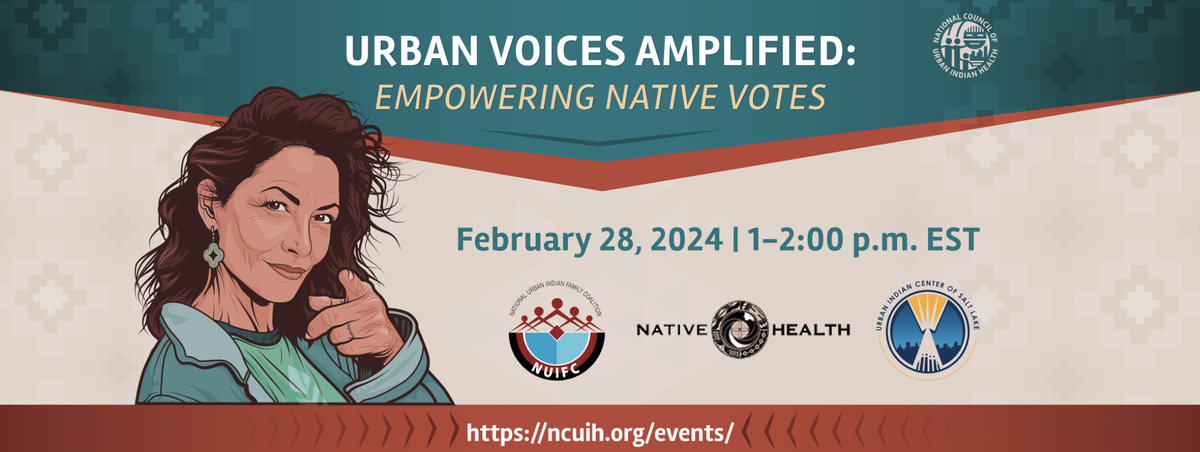
On Feb. 28, NCUIH hosted a policy webinar with UIO partners about voter engagement and mobilizing Native votes.
- UIO representatives presented: Ralyn Montoya (Navajo), Public Relations and Marketing Specialist at the Urban Indian Center of Salt Lake; Susan Levy, Communications and Community Relations Director at Native Health of Phoenix; and Rio Fernandes (Lower Elwha Klallam Tribe), Director of Civic Engagement at the National Urban Indian Family Coalition
- Watch the webinar here. Access NCUIH voting materials here.
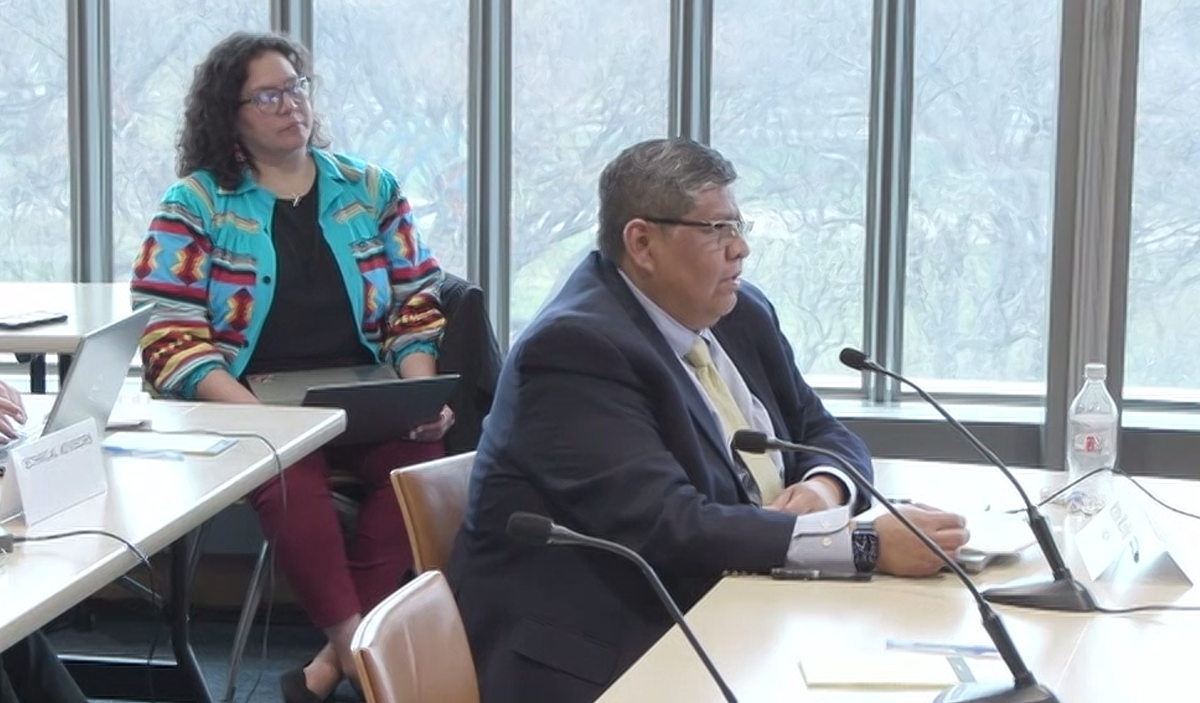
NCUIH President Elect, Walter Murillo (Choctaw), at CMS Tribal Technical Advisory Group (TTAG) Face-to-Face Meeting.
On March 6-7, CMS TTAG held a Face-to-Face Meeting
- NCUIH President-Elect, Walter Murillo, represented UIOs and spoke about urban Indian health issues, including 100% FMAP for Medicaid services at UIOs & traditional healing reimbursement.
- NCUIH & the National Indian Health Board accompanied Tribal Leaders during the MMPC/TTAG Hill Day on March 5.
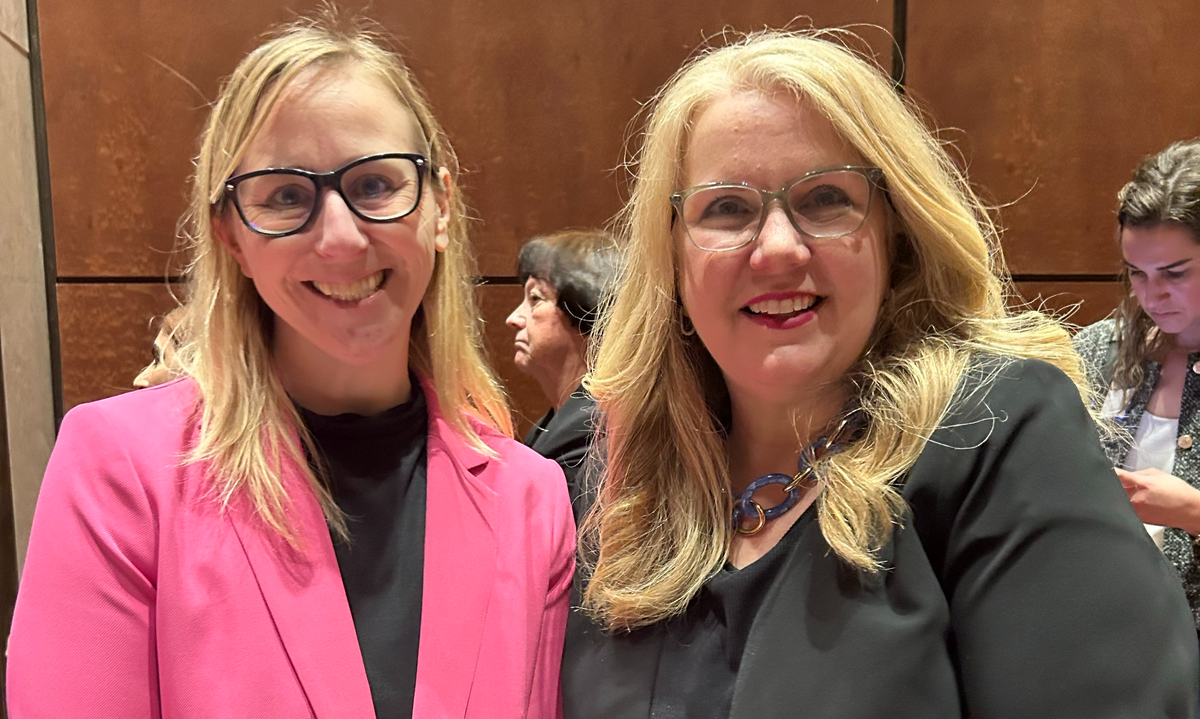
NCUIH VP of Policy and Communications, Meredith Raimondi, and HRSA Administrator Carole Johnson.
On March 13, NCUIH represented UIOs by attending a Health Resource and Services Administration (HRSA) Panel Discussion on the FY 2025 President’s Budget.
- NCUIH was able to talk to HRSA leaders about key UIO priorities such as Health Professional Shortage Areas (HPSA) scoring.
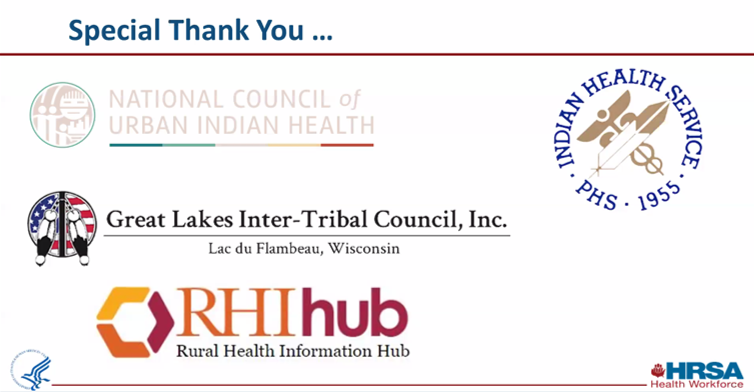
On March 14, NCUIH co-hosted the HRSA National Health Service Corps (NHSC) Webinar for Tribal Communities
-
Chandos Culleen, NCUIH’s Senior Director of Federal Relations, shared that UIOs are important sites to consider when applying for the NHSC scholarship.
-
Eligible Auto-approved sites for the NHSC include: Indian Health Service Facilities, Tribally Operated 638 Health Programs, and Urban Indian Health Programs. Eligible auto-approved NHSC sites must apply to the NHSC by taking the following steps:
– Log into the BHW Customer Service Portal.
– If the site is already listed under My Sites, select the site name and then select Start a NHSC Site App.
– If the site is not already listed under My Sites, select Create New Site in the left sidebar. After you create the site, select Start a NHSC Site App.
– Complete the application. Under the Confirm Site Details section, FQHCs/LALs must include their BHCMIS IDs, and ITU sites must include their ASUFAC numbers. Auto-approved sites are exempt from uploading documentation into their NHSC applications. However, they must submit documentation during site visits or upon request.
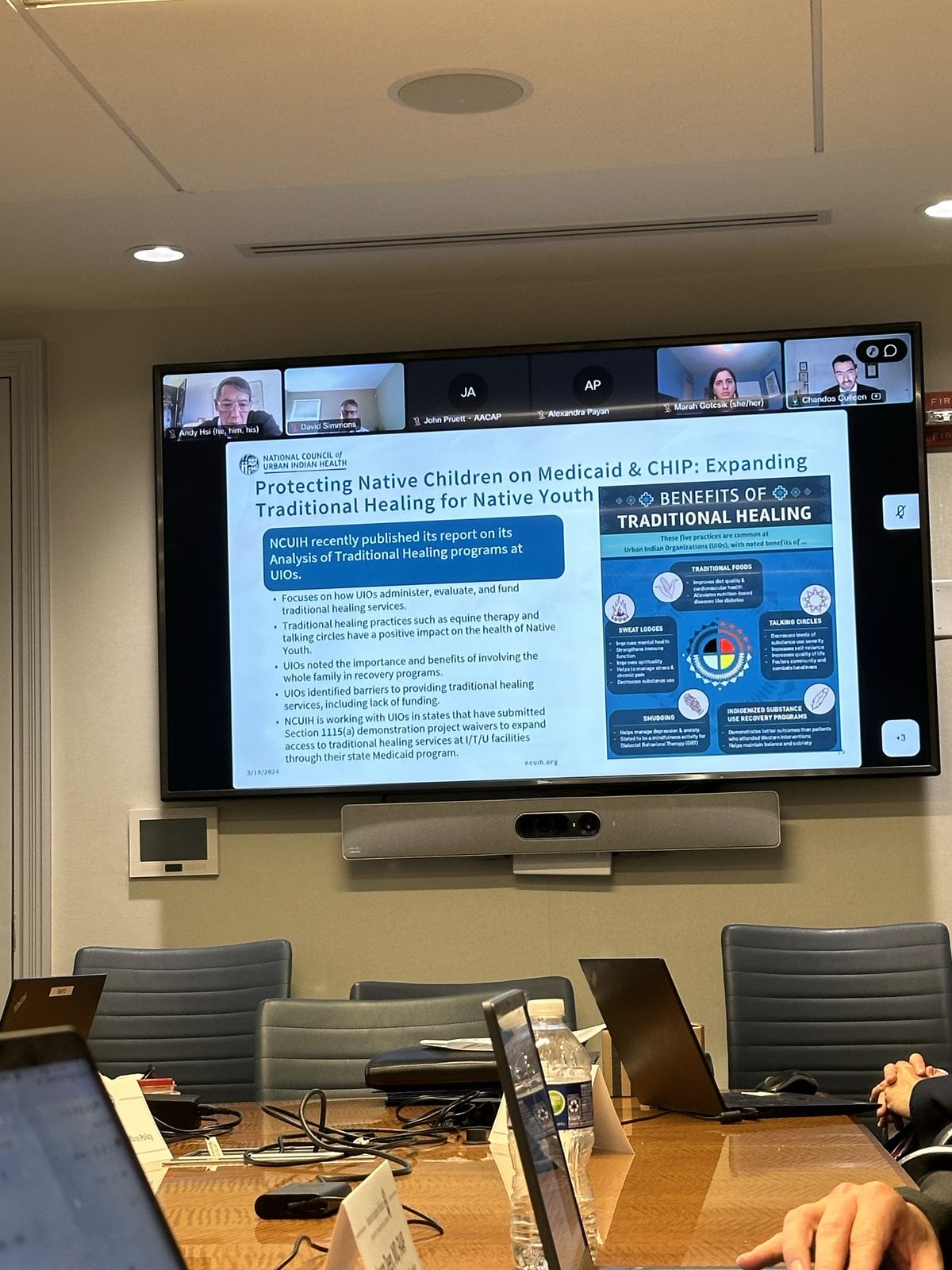
On March 18, NCUIH represented UIOs and presented policy updates at the American Academy of Pediatrics (AAP) Committee on Native American Child Health (CONACH) Meeting in Washington D.C.
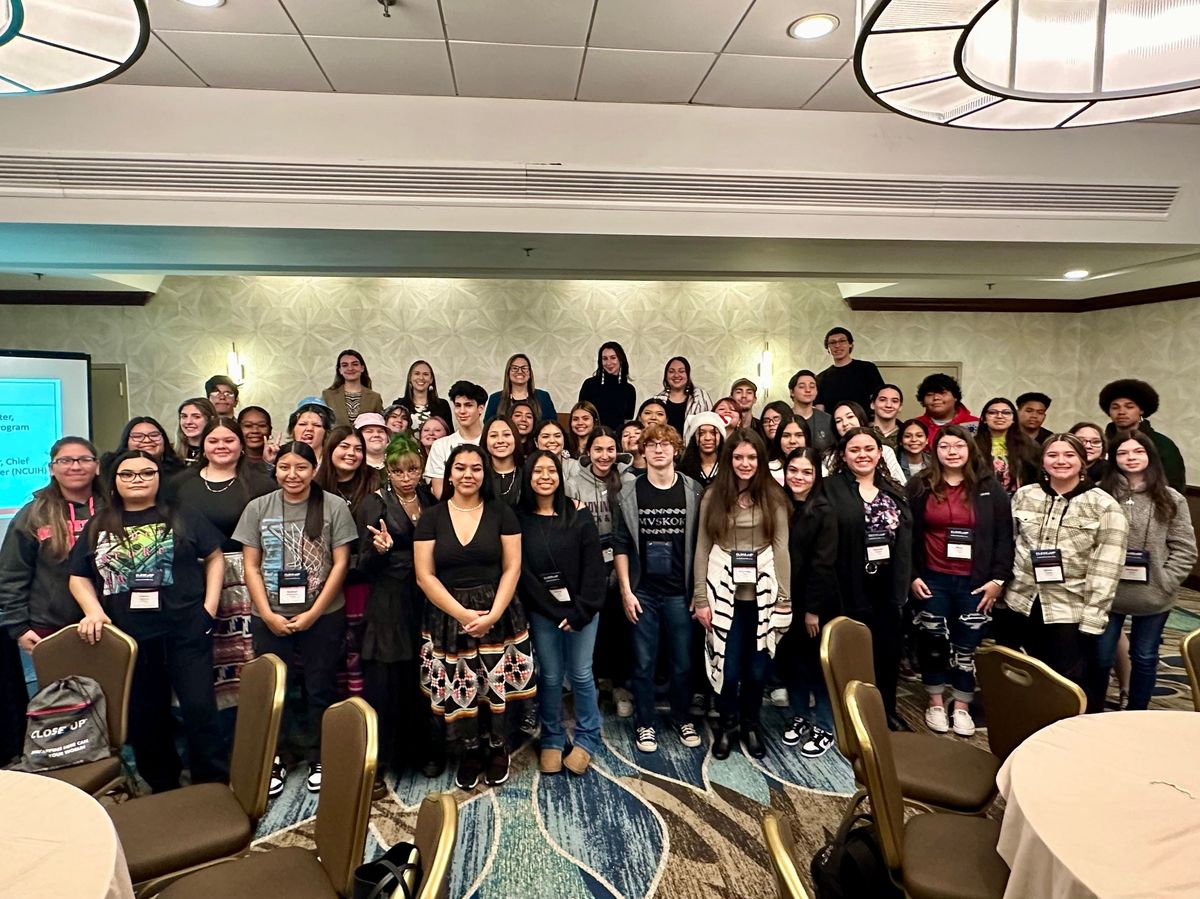
Francys Crevier (Algonquin), CEO of NCUIH, with the youth group and panelists at the Close Up Foundation/United South and Eastern Tribes, Inc. (USET) action expert panel.
On March 26, NCUIH CEO Francys Crevier joined an action expert panel organized by the Close Up Foundation and USET, emphasizing the importance of involving youth in policy advocacy to address pressing community issues.
One last thing, check out these upcoming funding opportunities:
-
IHS is accepting applications for grants for Native Public Health Resilience. This grant supports core Public Health functions, services, and activities to develop further and improve their Public Health management capabilities.
Application Deadline Date: May 14, 2024. (Apply)
-
IHS is accepting applications for grants for Native Public Health Resilience Planning. The purpose of this program is to assist applicants to establish goals and performance measures, assess their current management capacity, and determine if developing a Public Health program is practicable.
Application Deadline Date: May 14, 2024. (Apply)
